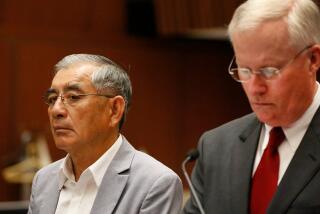Clinton Friend Often Visited White House, Records Show
- Share via
WASHINGTON — Former Arkansas restaurant owner Yah Lin “Charlie” Trie, who was responsible for collecting hundreds of thousands of dollars of questionable contributions to President Clinton’s legal defense fund, has been a frequent visitor to the White House in recent years, according to records released Wednesday.
The records show that Trie, 48, a close friend of the president for many years, had visited the executive mansion at least 23 times since January 1993, and perhaps more.
On at least six of Trie’s visits, the records show, Trie attended events or was at meetings that included the president. Two of those were so-called “photo ops” at which Trie had his picture taken with Clinton. He also attended at least two events with Vice President Al Gore.
In addition, the records show, Trie failed to appear for a scheduled visit with First Lady Hillary Rodham Clinton on Nov. 13, 1995. Earlier this week, the president’s lawyers said that Mrs. Clinton had no recollection of Trie when she was told last April about the questionable contributions to the legal defense fund.
The fund’s officials announced Monday that, since March, they had rejected or returned more than $600,000 in donations delivered to them by Trie. The fund was set up to help pay legal fees incurred by the president or the first lady arising from ongoing inquiries into the Clintons’ involvement in the Whitewater real estate development and other matters.
The fund officials were concerned that the true sources of the money had been concealed. For instance, some of the checks seemed to have identical handwriting and money orders supposedly from people in different cities were sequentially numbered.
California contributors apparently were responsible for a large part of the money and much of it appeared to come from members of an obscure Buddhist sect, known as Ching Hai.
One sect member, Tony Patel of San Francisco, told The Times that the head of the sect, Suma Ching Hai, who resides in Taiwan, may have inspired these contributions by giving a speech in Los Angeles earlier this year in which she expressed sympathy for Clinton.
It remains unclear how the sect’s money wound up in Trie’s hands. Trie himself has declined to discuss his fund-raising efforts and many sect contributors said that they had never heard of him.
Although the details of Trie’s visits to the White House were unknown previously, the president has made no secret of his longtime friendship with Trie, who operated one of then-Gov. Clinton’s favorite restaurants near the Arkansas state Capitol in the 1980s.
Trie, appointed by Clinton to a prestigious government trade panel, has told friends that he used his relationship with the president--and the White House photos--to gain access to Asians with whom he did business.
The White House records show that, besides the 23 times Trie is known to have gained admission to the White House, he was scheduled to visit on 14 other occasions.
The White House records also show that Trie visited a variety of White House aides. These include at least nine visits to the office of Mark Middleton, who was a White House aide until early 1995.
By all accounts, Trie has been a mentor to Middleton since he left the White House, giving him business advice and loaning him a Mercedes Benz for many months.
Middleton made headlines recently when a Taiwanese political consultant said that he witnessed a conversation in August 1995 in which Middleton and the chief financial officer of the ruling party in Taipei discussed the possibility of an illegal $15-million contribution to Clinton. Both Middleton and the party official have denied such an offer occurred. Trie was traveling in Taiwan with Middleton on that occasion in August 1995.
Trie also figures in the ongoing controversy over fund-raising by the Democratic National Committee. He was responsible for a $15,000 donation to the committee that came from a foreign company, which is prohibited from contributing to U.S. political campaigns.
More to Read
Sign up for Essential California
The most important California stories and recommendations in your inbox every morning.
You may occasionally receive promotional content from the Los Angeles Times.













